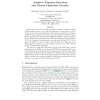Free Online Productivity Tools
i2Speak
i2Symbol
i2OCR
iTex2Img
iWeb2Print
iWeb2Shot
i2Type
iPdf2Split
iPdf2Merge
i2Bopomofo
i2Arabic
i2Style
i2Image
i2PDF
iLatex2Rtf
Sci2ools
EUROCRYPT
2010
Springer
2010
Springer
Adaptive Trapdoor Functions and Chosen-Ciphertext Security
We introduce the notion of adaptive trapdoor functions (ATDFs); roughly, ATDFs remain one-way even when the adversary is given access to an inversion oracle. Our main application is the black-box construction of chosenciphertext secure public-key encryption (CCA-secure PKE). Namely, we give a black-box construction of CCA-Secure PKE from ATDFs, as well as a construction of ATDFs from correlation-secure TDFs introduced by Rosen and Segev (TCC ’09). Moreover, by an extension of a recent result of Vahlis (TCC ’10), we show that ATDFs are strictly weaker than the latter (in a black-box sense). Thus, adaptivity appears to be the weakest condition on a TDF currently known to yield the first implication. We also give a black-box construction of CCA-secure PKE from a natural generalization of ATDFs we call tag-based ATDFs that, when applied to our constructions of the latter from either correlation-secure TDFs, or lossy TDFs introduced by Peikert and Waters (STOC ’08), yield precisely ...
Related Content
| Added | 19 Jul 2010 |
| Updated | 19 Jul 2010 |
| Type | Conference |
| Year | 2010 |
| Where | EUROCRYPT |
| Authors | Eike Kiltz, Payman Mohassel, Adam O'Neill |
Comments (0)

